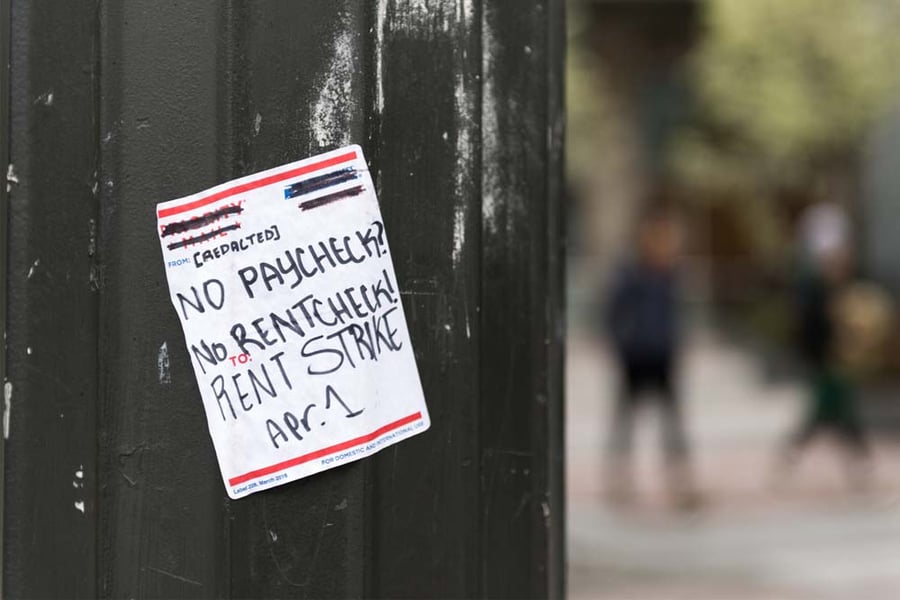If mortgages can be deferred, why not rents, ask advocacy groups in NY and CA

With over 3 million Americans applying for unemployment last week, a period that also saw over 8 million New Yorkers call the state’s Labor Department hotline, the next phase of the COVID-19 crisis has arrived: a nationwide inability to pay rent.
With tenants in two of the most affected states, New York and California, potentially forced into choosing between paying rent and buying food, housing advocacy groups are stepping up calls for legislation that goes further than what the governors of each state have already put in place.
Both New York and California have put moratoriums on evictions – two months in California, three in New York – but have yet to respond to demands that rents be reduced or cancelled while tenants are forced out of work by COVID-19. Tenants’ rights activists are therefore attempting to get the attention of lawmakers by proposing rent strikes.
“The reality is corporate landlords are already negotiating with their banks to figure out their mortgage situation and how to not pay,” Union de Vecinos organizer and East L.A. resident Kenia Alcocer told the Guardian. “Why not us? We’re the ones most impacted.”
Alocer estimated that more than 300 renters who work with her group will be refusing to pay rent. “They are talking to their neighbors and their family members, and the numbers are growing rapidly,” she said.
In New York, where an estimated 40% of renters may not be able to meet their monthly commitments, Cea Weaver and Housing Justice for All are organizing to cancel rent during the pandemic. It sounds drastic, but Weaver feels anyone who bristles at the use of the phrase “rent strike” is missing the point.
“Whether you call it a rent strike or not, it doesn’t really matter,” she says. “People aren’t going to pay the rent because they don’t have the money and the state doesn’t have a plan to get people money.”
While originators, lenders and rental property owners are all tending to their own fires, Housing Justice for All’s ultimate goal is a solidarity-fuelled change in public policy that will help those most affected by COVID-19 – low-wage workers, service industry employees, Uber drivers and other participants in the gig economy.
“The people who have lost the most income because of COVID-19 are not in the landlord industry,” says Weaver, but she adds that the group is also calling for mortgage relief for landlords that have been particularly hard hit.
Owners of rental properties may be wondering why those Weaver represents don’t approach their landlords directly for these pressing rent negotiations. She says there’s more at stake.
“If we win this directly from one landlord, it’s not enough, because everybody needs relief. Winning this directly from a landlord is not the same as a scalable policy solution.”
The cost of cancelled rents
Weaver is confident the benefits provided by rent cancellations will outweigh whatever pain is felt by property owners.
“I don’t think we need to jump to the conclusion that it’s going to be a crisis for landlords when their tenants don’t pay their rent,” she says. “The real estate industry will likely be fine.”
Teresa Tims, president of TDR Mortgage, doesn’t share Weaver’s optimism.
“I’m extremely concerned, especially with regard to my mortgage banking channel,” she says. All the loans TDR does are through wholesale lenders. With wholesale lenders originating more loans in the early days of 2020 than they did all of last year, Tims worries they are now “stuck holding this big bulk of product that they can’t resell. It’s creating havoc in our entire chain.”
More chaos could be on the way. Tenants withholding rent means landlords failing to pay their first-payment mortgage.
“That loan becomes completely unsaleable. What about the loans I did in the last few months, and those people aren’t making their payments?” Tims wonders. “If people don’t make their payments for six months, I pay back all of my commission – plus penalties.”
Thousands of originators will be experiencing the same pressure, with little to no relief on the way. Banks were taken care of in the recently passed $2 trillion government bailout, but there is no protection for mortgage bankers, who Tims says originated 75 percent of loans in 2019. How many of those loans are about to turn sour? How many of those originators will still be in business in June?
“Everybody thinks we’re going to get into summer and it’s going to be back on again, and that’s simply not the case,” Tims says, envisioning a point in the near future where even those workers currently deemed essential are told to stay home.
“What about in 30 days or 60 days when those people lose their jobs and they can’t make that $3,000 a month payment?” she asks. “Who’s going to want to lend money?”
Tims, who owns three rental properties, sympathizes with the people represented by groups such as Housing Justice. “You’re kind of feeling sorry for yourself because you’re shut in and your business is crumbling, and then you talk to somebody who has $100 dollars in the bank and that’s it. No unemployment or anything,” she says.
While Tims believes that tenants who cannot pay rent should not be forced to, she concedes that options are limited for all involved. Rent deferments would saddle renters with thousands of dollars’ worth of debt, further clogging the arteries of the American economy and potentially leading to the country’s next cardiac event.
“You can’t even move right now,” Tims says. “Who’s going to help you move? How are you going to pay for it?”



